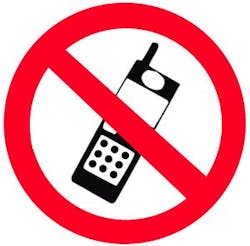Cell phone jamming: Implications for the security industry
Cell phone jammers popped up on my radar last week while reading through the email digests of Ken Kirschenbaum's alarm contracts email discussion list. The concern was that criminals could use cell phone jammers to attempt to disrupt the parallel communications paths for alarm signals, since many contemporary security systems use a cellular connection as a back-up communication method to the phone line or an IP connection.
I'm reprinting (with permission from Ken) the email from an anonymous listserve member who had experienced issues with criminals using cell phone jammers, but before we make this entirely one sided, I do want to mention that cell phone jammers do have positive uses when in the hands of trained security professionals. Trained security professionals will sometimes use cell phone jammers to block signals in high-risk government meetings where mobile communication of proceedings is not allowed. Additionally, according to an article from How Stuff Works, France has legalized some businesses (notably, theaters) to jam cellular signals. There have even been applications for preventing remote detonation of IEDs (here's a link to one company providing such technology).
There are legal uses of cell phone jammers, but in the wrong hands, jammers can be detrimental to the alarm industry.
Positive and legal uses of jammers aside, I think this contributor to Ken's list raises some very serious concerns about what jammers mean for alarm system users and monitoring firms. Below is the contributor's text, verbatim and unedited, from the listserve:
From time to time cell phone jammers show up at local party stores - they are "gag" gifts and not intended to disrupt cell communications... they are intended as "gag" items and the FCC rules and regulations do NOT apply.
I found one for $29.95 at a local party store - they are hard to find as they sell out quickly and most of the party stores buy 'lots' of stuff and never know when they will get some more - the package said to be sure and put this in your pocket at the next office party and watch the fun when someone tries to use their phone.
Its called a phone zonker - they never call them jammers. If they called them jammers they would draw legal heat - I have seen several versions of them and they all look pretty much the same and seem to be made by the same company however the packages change all the time.
About 18 months ago I found one outside of a convenience store that had been broken into... along with a couple cell phones that were calling the store's telephone number - the one I found looked completely different so there are probably several importers bringing these things into the country. The sheriff's dept couldn't find the address and the burglars saw the deputy drive by and they fled in several directions and left all their stuff on the newspaper rack right outside the front door. As luck would have it the store had an old long range radio and the signal came in just fine - if they had a new cellular backup there would have been no signal - makes no sense to install cellular with party stores selling these gizmos.
A couple weeks ago we found another one of these things at another convenience store - the burglars left it sitting on an a/c unit up on the roof - once again we lucked out because they cut a hole in the roof directly above the cellular backup and destroyed it before cutting another hole in the roof 100 feet away and destroying all the other alarm equipment. At this point a jogger saw them on the roof and called the police and the guys saw the jogger and took off.
I don't think we can depend on the FCC to be able to do much about this as these things are likely sold in thousands of stores and by mail order and on the internet and the logical choice would be to use a more secure backup method.
Also never call the secondary transmission method a 'backup' because that is just going to get you in big trouble... always call it 'parallel' reporting. Customers think the 'backup' is an independent system that works when the primary system fails. When that doesn't happen the way they thought it would they are going to sue.
If you're interested in Ken's list, visit his website at www.kirschenbaumesq.com and scroll down to the bottom where you can enter your email address to join his list.
-Geoff
About the Author

Geoff Kohl
Editorial Director/Editor-in-Chief/Associate Publisher
Geoff Kohl is the Marketing Director for the Security Industry Association (SIA). He is the former Editor-in-Chief of SecurityInfoWatch.com

